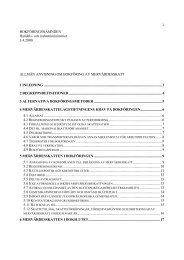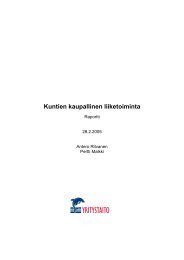Knowledge Intensive Services' Suppliers and Clients
Knowledge Intensive Services' Suppliers and Clients
Knowledge Intensive Services' Suppliers and Clients
Create successful ePaper yourself
Turn your PDF publications into a flip-book with our unique Google optimized e-Paper software.
11<br />
1 Introduction: KIBS in Context<br />
1.1 The role of KIBS<br />
<strong>Knowledge</strong> <strong>Intensive</strong> Business Services (KIBS) are among the fastest growing <strong>and</strong><br />
dynamic sectors of the economy (c.f. Table 1). They contain many innovative users<br />
of new technologies, especially Its; <strong>and</strong> they provide considerable potential for<br />
future employment growth. They play a role in improving the competitiveness of<br />
enterprises (<strong>and</strong> the quality of public services) throughout the economy. They form<br />
important intermediaries <strong>and</strong> nodes in innovation systems. Through innovation<br />
support <strong>and</strong> outsourcing of services, they can improve quality <strong>and</strong> help adapt<br />
production structures to the challenges of the knowledge-based economy.<br />
But while policy attention is beginning to be focused on KIBS, the statistical<br />
picture remains very underdeveloped, <strong>and</strong> there is very little comparative appraisal<br />
of policy measures aimed at the sector <strong>and</strong> its use. The interrelationships between<br />
KIBS <strong>and</strong> other economic activities remain very poorly understood. The available<br />
literature is very scattered. For example, management research has examined the<br />
role of business services in outsourcing enabling enterprises to concentrate on their<br />
core competencies. Innovation researchers <strong>and</strong> regional geographers have<br />
examined the role of business services in innovation networks <strong>and</strong> in the diffusion<br />
of knowledge. Studies of knowledge management <strong>and</strong> intellectual property<br />
systems have examined how business services tackle these issues. Economic<br />
analyses have related the growth of KIBS to structural change in the economy, <strong>and</strong><br />
sought to estimate the performance impacts of KIBS use. This paper seeks to bring<br />
together elements of this scattered literature. 1<br />
So what are KIBS, <strong>and</strong> how do they relate to <strong>Knowledge</strong> <strong>Intensive</strong> Services <strong>and</strong><br />
Service Activities more generally?<br />
1 A number of projects under the framework of the EC's TSER programme have undertaken relevant<br />
activities <strong>and</strong> reviews. These include the projects KISINN, RISE, SI4S, <strong>and</strong> TIPIK, details of which<br />
can be found on the cordis.lu website.
















